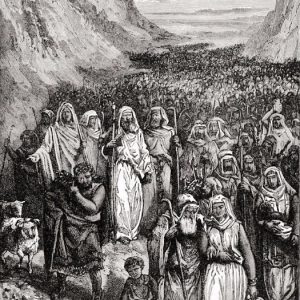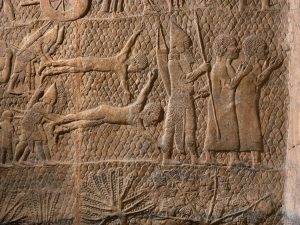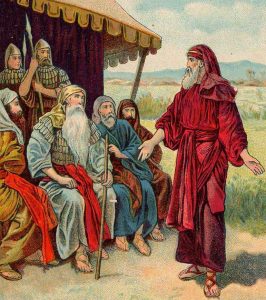
Shownotes
Wisdom-Trek / Creating a Legacy
Welcome to Day 816 of our Wisdom-Trek, and thank you for joining me.
I am Guthrie Chamberlain, Your Guide to Wisdom
Walk Like an Israelite – Wisdom Wednesday

Thank you for joining us for our five days per week wisdom and legacy building podcast. Today is Day 816 of our trek, and it is Wisdom Wednesday. The past several weeks on Wednesday we have been focusing on interpreting current events through a Biblical Worldview.
To establish a Biblical worldview, it is important that you also have a proper understanding of God’s word. Especially in our western cultures, we do not fully understand the Scriptures from the mindset and culture of the authors. In order to help us all have a better understanding of God’s word, I would like to invest the next several weeks reviewing a series of essays from one of today’s most prominent Hebrew Scholars Dr. Micheal S. Heiser which he has compiled into a book titled I Dare You Not to Bore Me with the Bible.
We are broadcasting from our studio at The Big House in Marietta, Ohio. If you ever invest much time around teenagers, and even adults for that matter, you will soon realize that within a certain group, they will start acting very similar, dressing the same, walking the same, using the same vernacular, and even taking on many of the same practices and traditions.
It was not any different when God called Abraham as a chosen person to start a new nation. Abraham, Issac, Jacob, and indeed the entire nation of Israel had many of the same practices, habits, and traditions of the surrounding nations and people groups. We in our western culture and society through the millennium have morphed into a much different mindset and practice. Because of this and the practices we have adopted, it is difficult to take on the mindset of the ancient Israelites and the surrounding nations.
So our essay for today is titled…
Walk Like an Israelite

Dr. Heiser explains his mindset change came during graduate schools when he took a course the Ugaritic language, which came from the Persian area and dates back prior to the calling of Abraham. Heiser puts it this way, “Cuneiform tablets changed my life. I’m not kidding. As I look back on my 15 years of graduate school in biblical studies, the turning point in how I view the Bible was my course in Ugaritic, a cuneiform language very similar to biblical Hebrew. This class compelled me to transform how to ‘read the Bible in context’ from a naive platitude to an issue of spiritual integrity.”
· A Bible Study Epiphany
Most of us have had the impression that interpreting the Bible in context meant learning about a piece of pottery here, an odd custom there, or a factual acquaintance with who was alive, and what those people were doing at the time of the biblical events.
Through his study in his Ugaritic course, Heiser learned that all of that can divorce the Bible from the ancient world in one critical way: It can exclude religious or theological ideas from all the “context talk.” It’s easy to presume that most of the Bible’s theological content was unique to Israel. We usually think that Israel shared some cultural customs with pagan Gentiles—like diet, dress, marriage, and family structure. When we come to think about Israel’s religious worldview, we think it was uniquely handed down from heaven, having no common links with paganism. Not true – the similarities in the Ugaritic tables is striking.

For starters, the people of Ugarit, which was a city-state in ancient Syria, described their gods with words and phrases that were in the Old Testament—in a number of cases word for word. Their chief deity shared the same name (El) as the God of Abraham, Isaac, and Jacob. An important difference is the El of Ugarit could hardly be called holy by biblical standards. The honorary titles and other descriptions of the Ugarit El and his primary assistant, Baal, are applied to the God of Israel in many passages in the Old Testament.
There are other examples. The behavior of prophets and the use of divination compared to casting lots or consulting the ephod have clear ancient Near Eastern parallels. The design and purpose of the Ark of the Covenant align well with the use of sacred boxes known as palanquins in ancient Egypt.
Trial by ordeal, such as that found in Numbers 5, where a woman accused of adultery must drink a potion to test her fidelity, occurred in surrounding cultures. Terms for Israelite sacrifices are found in ancient Gentile religious texts. The belief that the sky was a solid mass is part of the ancient Near Eastern cosmology shared by the Bible Job 37:18, “He makes the skies reflect the heat like a bronze mirror. Can you do that?” Proverbs 8:28 says, “I was there when he set the clouds above, when he established springs deep in the earth.”
In our thought process, the notion that the seat of our intellect and emotions is referred to as heart or mind. In the ancient near Eastern thought, including Israel the intellect and emotions were our kidneys or intestines. This was common throughout the ancient worlds.
· Spiritual Lessons and Implications
Discovering some of these nuances may be a little shocking. God can use a temporary discomfort of our mindset to produce honesty with our understanding of the biblical text. We needed to think like an ancient Israelite to better understand the Old Testament.
Israelite religion had some significant divergences from the religions of other surrounding nations, but on the whole, there were more similarities than differences. I came to the realization that the correct interpretive context for the Bible is not the early church, the Protestant Reformation, the Puritans, or modern evangelicalism. Those historical contexts are alien to the Bible. Rather, the context for understanding the Bible is the historical, literary, intellectual and religious context in which it was written.
Although He could have done so, God didn’t change Israel’s culture when dispensing His truth. He didn’t give Israel a new culture that was dramatically distinct from Israel’s neighbors. That choice would have produced something indecipherable to the people of the time. That would have undermined the whole enterprise of communication.
What this means is that inspiration operates within a cultural context chosen by God in His sovereign wisdom. We cannot honor God’s choice of communication strategies if we refuse to ignore the deep worldview connections shared by both Israelites and pagans.
The profound contextual overlaps between Israel and her pagan neighbors was a wise theological tactic on God’s part. When divergences in Israel’s theology appear in the text—and there are some dramatic, stark points of contrast—they scream for attention on the part of the ancient reader.
Unlike the pagan deities, Israel’s God could not be cajoled like an idol; Yahweh could not be brought down to earth and tamed. Laws about sacrifices were set in specific covenant contexts, giving them a unique theological dimension. Yahweh would rather have faith and loyalty than sacrifice. As the prophet, Samuel tells us in 1 Samuel 15:22, “But Samuel replied, ‘What is more pleasing to the Lord: your burnt offerings and sacrifices or your obedience to his voice? Listen! Obedience is better than sacrifice, and submission is better than offering the fat of rams.'”
Next Wisdom Wednesday we will look at Dr. Heiser’s next essay titled Even the Bible Needed Upgrading. I believe you will find this another interesting topic to consider as we build our Biblical worldview.
Tomorrow we will continue with our 3-minute wisdom nugget that will provide you with a bit of wisdom that, if followed will allow you to grow healthier, wealthier, and wiser each day. So encourage your friends and family to join us and then come along with us tomorrow for another day of our Wisdom-Trek, Creating a Legacy.

That will finish our trek for today. If you would like to listen to any of our past 815 treks or read the Wisdom Journal, they are available at Wisdom-Trek.com. You can also subscribe to iTunes or Google Play so that each day’s trek will be downloaded automatically.
Thank you for allowing me to be your guide, mentor, and most of all your friend as I serve you through the Wisdom-Trek podcast and journal.
As we take this trek together, let us always:
- Live Abundantly (Fully)
- Love Unconditionally
- Listen Intentionally
- Learn Continuously
- Lend to others Generously
- Lead with Integrity
- Leave a Living Legacy Each Day
I am Guthrie Chamberlain reminding you to Keep Moving Forward, Enjoy Your Journey, and Create a Great Day Everyday! See you tomorrow!